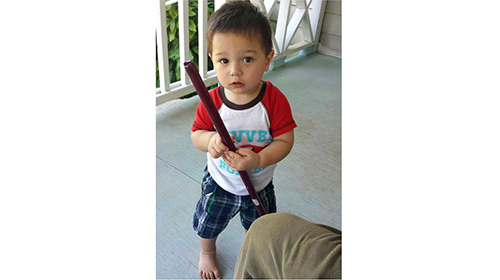How Many People Must Be Maimed or Killed Before We End the Militarization of Our Police Forces?


Yesterday, a grand jury in Habersham County, Georgia, not to bring charges against the police officers who threw a flashbang grenade into the crib of Bounkham Phonesavanh, known affectionately as "Baby Bou Bou." The explosion left a hole in the then-19-month-old's chest, exposing his rib, and almost ripped his nose from his face.
How could this happen? Combine systemic police militarization, the war on drugs, and sloppy police work, and you have the perfect recipe for disaster.
In May, the Habersham County Special Response Team executed a no-knock drug raid on the home of a family friend where Baby Bou Bou, his parents, and sisters were staying. It was the middle of the night, and even though the family's minivan was parked in the driveway and children's toys were in the yard, a squad of SWAT officers decided to throw a flashbang grenade into the living room.
Acting and looking like an invading army, the cops broke down the door, terrorizing the entire family. When Alecia, Baby Bou Bou's mother, tried to go to him, they screamed at her to shut up. They violently threw and pinned Bou, his father, to the ground, injuring his shoulder so badly he cannot take care of his children alone anymore. Alecia and Bou did not see their son until they arrived at the hospital several hours later.
When they were able to see him, they were devastated.
The explosion from the flashbang tore a hole in Bou Bou's chest, separated his nose from his face, and covered his body in third degree burns. His injuries were so severe that doctors placed Bou Bou in a medically induced coma.
And for what?
The man the SWAT team was looking for no longer lived in the house and was later arrested without incident. There weren't any guns or drugs in the home either. To add insult to injury, the county refuses to pay the Phonesavanh's medical bills, which now total $1 million, the law doesn't allow it.
The Phonesavanh family, however, is not alone. SWAT teams raid people's homes approximately 50,000 times a year in the United States. Most of these raids are to search for drugs. Many of them result in tragedy.
In May, the police shot and killed a man in his home during a to search for some marijuana. The man had reported that he was fearful of being burglarized and the police told him: "If anyone breaks into this house, grab your gun and shoot to kill." When he followed their instructions, they killed him.
In July, a St. Paul SWAT team a home and killed the family dogs in front of two young children. All they found was some marijuana.
Earlier this month, the Georgia State Patrol a helicopter and a K-9 Unit to a man's home in search of what they thought was marijuana. It turned out to be okra.
As we pointed out in our report, War Comes Home: The Excessive Militarization of American Policing, police militarization is real. And it can be deadly. America watched in horror as law enforcement responded to the peaceful protests in Ferguson, Missouri, as though they were an invading army. They threatened to kill peaceful protesters. They pointed assault rifles at people exercising their right to peaceably assemble. They jailed journalists.
Some lawmakers have that the answer is better training. Training will help, but it is not an answer to the very real and very entrenched problem of police militarization.
Law enforcement agencies have been aggressively using military weapons and tactics in communities of color for decades, mostly for the purpose of waging the failed and wasteful War on Drugs. They have been able to do so largely courtesy of the federal government, which funnels billions of dollars' worth of funding and equipment to state and local law enforcement agencies – equipment that was designed for combat.
Habersham County, where the flashbang exploded in Baby Bou Bou's crib, has received at least 17 assault rifles, 13 automatic pistols, two utility trucks, and an armored personnel carrier from the federal government in the last 10 years alone. When the police use combat weaponry to serve drug warrants and respond to peaceful protests, they do so knowing that they are using weapons and tactics designed for war against their own citizens.
What happened to Baby Bou Bou is not a rare occurrence, and neither is the lack of accountability for the police officers who altered his life forever. It's the price our communities pay – young and old, disproportionately black and brown – when police believe they are counterinsurgents waging the War on Drugs, and Uncle Sam arms them that way.
It is time to end police militarization. Not only through improved training, but through an end to the federal programs that fuel it and a shift in how the police view the communities they're meant to protect and serve.
Learn more about militarization of the police and other civil liberties issues: Sign up for breaking news alerts, , and .

